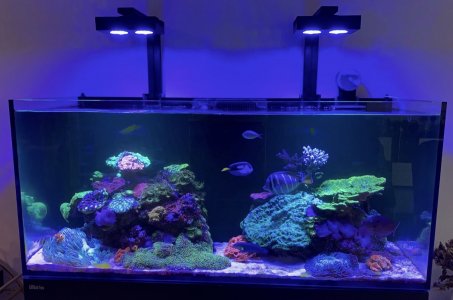Hi All,
My current reef tank is currently 4.5 years old and is a mix of LPS and SPS. All very healthy and happy until 3 weeks ago.
Tank is a Red Sea Reefer 350, and water chem before the incident was as follows:
-Alk: 11.1dkh
-Cal: 510ppm
-Mag: 1380ppm
-PH: 7.66
-Ammonia: 0ppm
-Nitrite: 0ppm
-Nitrate: 7.4ppm
Three weeks ago I had my 7 year old wrasse pass away and found him half eaten in the corner of the tank. (May have been in there a few days)
I checked nitrates immediately and was over max reading of 50ppm. I did a 30% water change that day, then another 30% the next day.
But damage had been done and I lost 3 large sensitive SPS colonies in the next 12 hours.
Tested nitrates again and the are back to 48ppm due to SPS RTN.
So twice a day for 5 days i did a 20% water change and got nitrates down to 22ppm.
But now 3 days later nitrates are back to 43ppm.
I cannot locate the source of the nitrates, so looking for ideas on how to lower nitrates back to previous levels.
I am already doing the following:
-dosing 7ml no pox per day
-have healthy Marco algae in the sump
-have skimmer running wetter than normal
-have reduced fish feeding to half previous rate
-have vacuum syphoned all reachable coral sand
-have increased flow in the tank to help suspend particles (I have crazy high flow capacity)
Any ideas would be very welcome.
I included a photo of my tank post SPS loss, most coral is still very happy. But nitrates are still over 40
My current reef tank is currently 4.5 years old and is a mix of LPS and SPS. All very healthy and happy until 3 weeks ago.
Tank is a Red Sea Reefer 350, and water chem before the incident was as follows:
-Alk: 11.1dkh
-Cal: 510ppm
-Mag: 1380ppm
-PH: 7.66
-Ammonia: 0ppm
-Nitrite: 0ppm
-Nitrate: 7.4ppm
Three weeks ago I had my 7 year old wrasse pass away and found him half eaten in the corner of the tank. (May have been in there a few days)
I checked nitrates immediately and was over max reading of 50ppm. I did a 30% water change that day, then another 30% the next day.
But damage had been done and I lost 3 large sensitive SPS colonies in the next 12 hours.
Tested nitrates again and the are back to 48ppm due to SPS RTN.
So twice a day for 5 days i did a 20% water change and got nitrates down to 22ppm.
But now 3 days later nitrates are back to 43ppm.
I cannot locate the source of the nitrates, so looking for ideas on how to lower nitrates back to previous levels.
I am already doing the following:
-dosing 7ml no pox per day
-have healthy Marco algae in the sump
-have skimmer running wetter than normal
-have reduced fish feeding to half previous rate
-have vacuum syphoned all reachable coral sand
-have increased flow in the tank to help suspend particles (I have crazy high flow capacity)
Any ideas would be very welcome.
I included a photo of my tank post SPS loss, most coral is still very happy. But nitrates are still over 40

